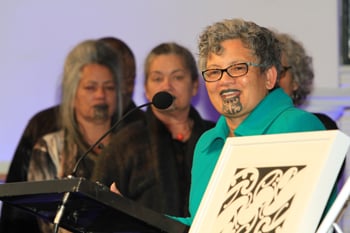
Erana Ta Haeata Brewerton accepting a lifetime achievement award on behalf of her late mother, Dame Kāterina Te Heikōkō Mataira. (file photo, Massey University)
A 60-year-old Maori woman was denied entrance to a public bath house in northern Japan because of her traditional tā moko facial tattoo. Japanese bath houses, known as onsen, typically bar anyone with tattoos to keep away yakuza gangsters, many of whom sport full-body tats.
Erana Ta Haeata Brewerton had been attending an academic meeting on indigenous languages. She attempted to enter an onsen in Eniwa, Hokkaido, but was turned away because of her ta moko tattoo, according to an AFP article. A ta moko is a traditional Maori tattoo that signifies which tribe the bearer is from.
Kenji Sekine, an Ainu language lecturer, said, “We protested, saying the tattoo was not anything anti-social, and that only respected people are allowed to wear them in her culture.”
An official from the onsen said, “Even if it is traditional culture, it is difficult to expect other patrons to understand the difference between one tattoo and another. A typical person cannot judge the context behind the tattoos.”
This onsen’s operators must think their patrons are so stupid. I’m sure a typical person can tell the difference between a 60-year-old Maori woman and a yakuza gangster. While other patrons might feel uncomfortable around a foreign woman with a facial tattoo, that is their problem, not hers.
A couple other notes on context make this story even more ridiculous. First, the onsen was located in northern Hokkaido, the heart of Ainu territory. Ainu are the indigenous people of Japan, and women in their culture tattoo their lips. So the onsen’s operators should have been familiar with the concept of traditional facial tattoos. Second, nowadays many yakuza forego the customary tattoos and pinkie severing so they won’t be branded as gangsters. So banning tattoos to keep out yakuza won’t even accomplish the purpose for which the rule was written.
The problem here, which is typically Japanese, is that once a rule is written, it is enforced without exception. The argument goes once an exception has been made, it sets a precedent, and then the floodgates will be open to all kinds of crazy allowances. I encountered this logical fallacy when I wanted to give my elementary school students candy on Halloween. I was told it was against school rules for students to have candy. I argued the students would understand this was a one-time thing for Halloween. But the vice-principal said, “If we let them have it once, they’ll think it’s OK to have candy all the time.” I suggested standing outside the school gates and giving it away to the students on their way home from school. But then I was told, “No. Because then the students will eat the candy at home.” Apparently the school wanted to control what its students consumed outside of class as well.
I picture the Japanese encountering many problems like this when Tokyo hosts the 2020 Olympics (I have to keep in line with the fad of every news article written about Japan in the past couple weeks mentioning the Olympics). When Japan hosted the 2002 FIFA World Cup, police told the public to be on the alert for “soccer hooligans.” They predicted rampant soccer riots (the only fun part of the game) would break out on the streets. Police were told to break up crowds of foreigners, even if they weren’t breaking any law.
Bath houses’ blanket ban on tattoos is just one of many things the Japanese will need to reconsider if they hope to host an international event in seven years.